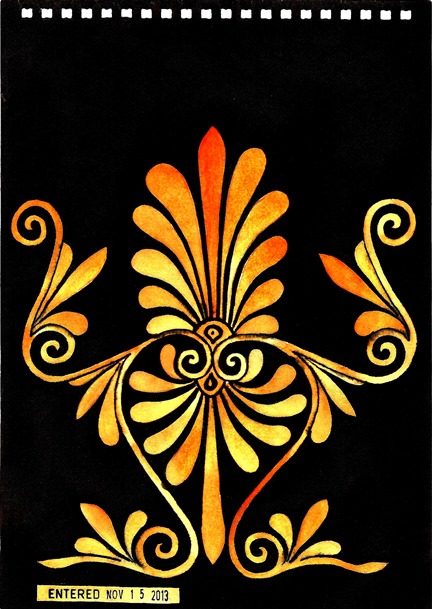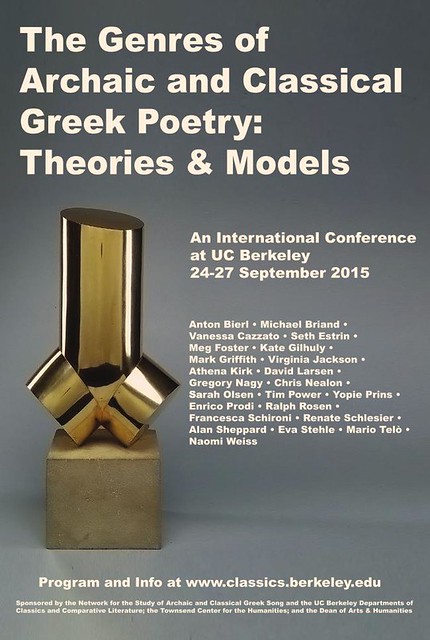February 2, 2016
Attributed to al-Khalīl ibn Aḥmad (2011 throwback)
tr. by David Larsen at 6:00 PM
Labels: Arabic prose
January 22, 2016
A latter-day Pentheus
For example, in mythic narration the wilderness retreats and ecstasies of religious devotees are combined with wilderness tales of the gods themselves. This probably happens for the same reason that the skies are thought to be inhabited by gods with altruistic foresight that they manifest through signs. Now there are life-sustaining enterprises, like mining and hunting, that obviously have things in common with wilderness retreats, but ecstatic worship and mantic prognostication are more of a matter for mountebanks and charlatans, as are all the clever arts—above all, the arts of Dionysian rite and Orphic song.
Strabo, Geography X.3.23
tr. by David Larsen at 12:08 PM
Labels: Greek prose
December 21, 2015
This is happening

An excerpt from my translation of the Names of the Lion
by Ibn Khalawayh will appear in the expanded 2017 edition
of Technicians of the Sacred, ed. Jerome Rothenberg.
Thanks, Jerry!
tr. by David Larsen at 10:14 AM
Labels: Announcements
November 30, 2015
Written on silk
was bedolled with a limpid ruby. The seal upon it
was pressed in gold dust instead of clay, and the embossment
read: "I pledge to you my life and the lives of my whole family."
Inside, the greeting [said]: "To you from me,
the long-distracted by my memory and pining for you."
And the address: "To one who is [no less] love-crazed,
The heart of an infatuate [is here enclosed]."
A poem of ‘Umar ibn Abī Rabī‘a
tr. by David Larsen at 6:21 PM
Labels: Arabic poetry
October 20, 2015
Guest lecture by Martin Schwartz
tr. by David Larsen at 2:57 PM
Labels: Greek poetry , Secondary literature
September 29, 2015
Al-Jahiz on pre-Islamic prayer for rain
Out in the thorn-trees, the folk you see, they of the droning clamor,
have suffered visitation by a year of biting [drought].
They who, in times gone by, did not [condescend to] eat
unleavened things now gobble dry flour.
Out of the flatlands and up the mountain's side they drive
emaciated cattle, harrying them with fear of their demise,
with burning torches tight in the short hairs of their tails,
tied there so that “seas” be stirred [out of the skies]
- until they are roasted through, and a cloud rears up above them,
and another upward-rearing cloud is driven to its side,
and the divinity sees it mark [the earth] with precipitation
when a rain-bringing South wind finally blows up for [the tribe].
The lofty cloud pours down its water – a rain to put
an end to great [suffering], now averted
by a quantity of sala'-wood, and 'ushar-wood to match it:
no easy burden for the cattle burdened with it.
The Book of Animals IV.466-7.
tr. by David Larsen at 8:10 PM
Labels: Arabic poetry
September 17, 2015
September 1, 2015
Buddhist Nights
At this time, in another kingdom, there was a girl as beautiful as he, who fashioned the image of a man out of gold. She said to her mother and father: "I will marry a man like this, if he can be found." Both sets of parents made inquiries, and across the distance they contracted a marriage between the two, and solemnized their union as husband and wife.
It happened after this that, clutching a mirror, the king of the realm demanded of his ministers: "In all the world, is there a man whose face rivals mine?" They responded: "We who are your subjects have heard it said that there is another man in the kingdom whose beauty surpasses all others." At once the king dispatched a messenger in search of him.
On finding him, the messenger said to the young man: "The king desires the benefit of your wisdom." Straightaway the young man prepared his chariot, and had already set off for the palace when the thought hit him: "It is for my intelligence that the king summons me." To gather the teachings he thought he would need from his books, he therefore returned to his home, - where he found his wife in a state of abandon with a complete stranger. The emotional distress this caused in him had an altering effect on his face, producing an extraordinary physiognomic change for the worse that only worsened as time went on.
[Outside the palace,] the young man's reduced state did not escape the notice of the king's minister, who thought the rigors of the journey were what had thinned his face. And so he had a place set aside for him in a stable, - where, in the middle of the night, the young man spied the king's own consort entering the stable and joining one of the grooms in illicit union. His heart at once was lightened: "If this is how the wife of a king conducts herself?" he thought. "No wonder my wife does the same." At this, his worries evaporated and his face regained its former beauty.
The time came for his interview with the king, who asked: "Why have you lodged outside the palace for the past three days?" The young man responded: "After setting off with your messenger, I thought I had forgotten something, and went back along the road to my house in order to get it. There I found my wife in a state of abandon with a stranger. It pained me sharply, and in my extremes of pathos and rage, my face became altered. For three days I rested in a stable, O King, - where I saw your consort in illicit union with one of the grooms.
"If this is how your wife conducts herself," the young man continued, "then no wonder my own wife does the same. My worries have evaporated, and my face has regained its composure."
"If this is what my own wife is like," said the king, "then how much more so ordinary women!"
Thereupon, both men took off to the mountains together. They cut their beards and shaved their heads and became ascetic devotees. Adopting the view that the company of women makes sacred occupations and devotions impossible, their progress toward excellence was uninterrupted, and both men attained the way of the Pratyekabuddha.
From the Jia za pi yu jing (Ancient Book of Various Metaphors) attributed to Kang Senghui (d. ca. 280 CE), and included in the Taishō ed. of the Chinese Buddhist canon; French tr. by Édouard Chavannes, Cinq cents contes et apologues extraits du Tripiṭaka chinois (Paris: Ernest Leroux, 1910-34), vol. 1, 374-6.
August 16, 2015
A Bacchic scene
A flute pours out its woes with a plaintive sob, to the
tumult of the bows and strings. And the rose is laughing.
It is a breezy day's debut into the bloom of spring,
highlit like a bride's outfit in pearls and gold.
The revels of night become day-drinks. Frivolity keeps
[the cup] going round in the same order, whether
willed [by the drinker]
or pressed upon him. Were we heated! I swear, it was
the sun's own beams that swirled in our cup and
heated us.
The people were a brotherhood of truth. The tie uniting
them was a love surpassing kinship by descent.
Nursed together on the squirting stream of a pale pink
[quantity of wine], each gave his fellow nursling
his due,
and the drunken man's offense was not held against him.
No doubt about their character need trouble you.
The best teachers are the days themselves, and time's
long stretches, and those moments when
defects of fortune are overturned.
tr. by David Larsen at 11:02 AM
Labels: Arabic poetry
January 26, 2014
Shame and fear
"Why is it, despite the similarity between shame and fear, that those who feel the former turn red, but those who feel the latter turn pale? It is because the blood of the ashamed is diffused from the heart to the other parts of the body, and so to the body's surface; the blood of the fearful, meanwhile, abandons the other parts of the body and gathers in the heart."
I was in the company of our own Calvisius Taurus at Athens when I read this, and I asked how much sense he thought it made. He said: "As an account of what happens when the blood is diffused or concentrated, it is accurate and true. But he has not said why these things happen. The question of cause is still open: why does fear concentrate the blood, and shame scatter it? After all, shame is a sub-category of fear, as the philosophers define it: 'Shame is the fear of deserved blame.' "
Aulus Gellius, Attic Nights 19.6
tr. by David Larsen at 12:23 AM
Labels: Greek prose
December 26, 2013
Diet of words
Ambrosius (who supplied our Adamantius aux organes splanchniques du bronze with the parchment, copyists, and funds that made it possible for him to produce his innumerable commentaries), remarks in a letter written from Athens that he had eaten no meal in Origen's company without something being read aloud, nor lain in his guest-bed unaccompanied by a reading from Scripture by one of the brethren, whose readings and prayers followed in continuous succession day and night.
We creatures of the belly, did we ever thus? We who yawn, and rub our eyes, and can barely contain our annoyance after one hour of reading? Then, as if after some great task, we go back to involvement with the business of the world. I say nothing of the heavy meals that depress our faculties, and am ashamed to mention the time lost each day to anticipation of visitors, or the visits we pay to others—when straightaway the prattle starts, and our words are wasted on tearing apart third parties. In dissecting the lives of others, we bite and in turn are bitten, and even as we take our leave we are busy chewing.
When friends have all gone home, our minds keep working. Now resentment makes a lion's face to flash across our own; now plans run through our minds in obsessive bursts, heedless of the Gospel's warning: "Tonight your dumb ass will be stripped of your life/soul. Who do your stored-up goods belong to then?"
Jerome, Letter 43 (To Marcella, in praise of country life)
tr. by David Larsen at 8:12 AM
Labels: Latin prose
December 23, 2013
Palmette II
 From a terracotta bell-krater (ca. 465-460 BCE) attributed to the Altamura Painter.
Museo Archeologico Nazionale, Ferrara
From a terracotta bell-krater (ca. 465-460 BCE) attributed to the Altamura Painter.
Museo Archeologico Nazionale, Ferrara(
December 19, 2013
November 30, 2013
Deliberative measures
Between judgment by analogy (qiyās) and independent reasoning (ijtihād), the difference is as follows. Analogy is the act of holding one thing against another in view of some likeness adjudged between them. Others say that it is the imposition of one's judgment of the former thing upon the latter by virtue of a perceived likeness. Abū Hāshim al-Jubbā’ī, may God have mercy on him, defined it as "holding one thing against another and imposing one's judgment of the latter upon the former," explaining that a standardized measurement is for this reason called an "analogical implement" (miqyās): whatever one wants measured must be held against it. In this way, the shoemaker's template used for matching soles to one another is called a miqyās.
Qiyās therefore refers exclusively to the use of one thing in order to make a judgment about another thing, and its root verb qāsa yaqīsu is used in this same sense. Mere likeness between two things is not analogy; qiyās is not said unless the two are correlated such that a judgment incumbent upon one is applied to the other. In this sense, God (be He exalted) might well be called al-Qāyis ("The Analogist"), for the likeness He enforces between the unbelieving and the dead (35:22), the believer and the living (36:70), unbelief and darkness (6:122) and belief and light (61:8).
Whoever defines analogy as "the abstraction of what is true from what is invalid" is way off. This may define something, but it can't be called analogy. Here is an example of analogy: "If a good person is susceptible to committing an offense that a wise man is not, then the good person is liable to a penalty that the wise man is not." In the parlance of legal scholars, it is to hold a "branch" [i.e. the case under consideration] against a "root" [a precedent case whose judgment is secure] in order that the rationale of the latter ruling be applied to the former.
The original meaning of ijtihād is "utmost exertion." One can be said to "exert one's utmost" in carrying a stone, but in carrying a date pit there is no exertion. Theologians define it as the process that determines the preponderance of one opinion [above all others] in matters that call for judgment, such that all who practice it will reach the same conclusion. And their reference to statements by "the people of qiyās" and "the people of ijtihād" proves that these methods are not the same. Analogy is more specialized than ijtihād, which includes analogy and other methods besides. [Even so,] al-Shāfi‘ī says that ijtihād and analogy are the same thing; according to his definition, ijtihād means applying the rationale of legal precedent to the exclusion of all else. Legal scholars define it as exerting one's utmost in figuring out how the law applies to a given situation, in a way that is neither obvious nor coeval with the law's original intent.
This is what Mu‘ādh ibn Jabal meant by saying: "I will exert my utmost to reach an opinion (ajtahidu ra’yī) in those cases wherein I find no answer in the Qur'ān or sunna." "Opinion" (ra’ī) here is the outcome of deduction and analogy applied toward legal judgment. ‘Umar ibn al-Khaṭṭāb [once reprimanded a scribe who concluded a legal brief with the words: "This is the opinion of God and ‘Umar." Seizing the document, he crossed them out and] wrote: "This is the opinion of 'Umar." And ‘Alī, peace be upon him, once said: "My opinion and the opinion of 'Umar is that [slave women who have borne children to their masters] must not be sold." Those who denigrate opinion are refuted by these statements, which uphold the validity of rulings based on rationale and report, when these have been tested against an opposing view.
Ijtihād is said only for reasoning applied to legal matters. [...] The study of physics cannot be spoken of as a form of ijtihād in the way that ijtihād is applied to inheritance law. Nor is ijtihād applicable to calculations like how many five-dirham shares are in a hundred dirhams, where there is no difference of opinion. Qiyās, on the other hand, is applicable to a variety of intellectual pursuits. The difference between them is therefore clear.
Abū Hilāl al-‘Askarī, The Book of Lexical Distinctions
tr. by David Larsen at 11:15 PM
Labels: Arabic prose







